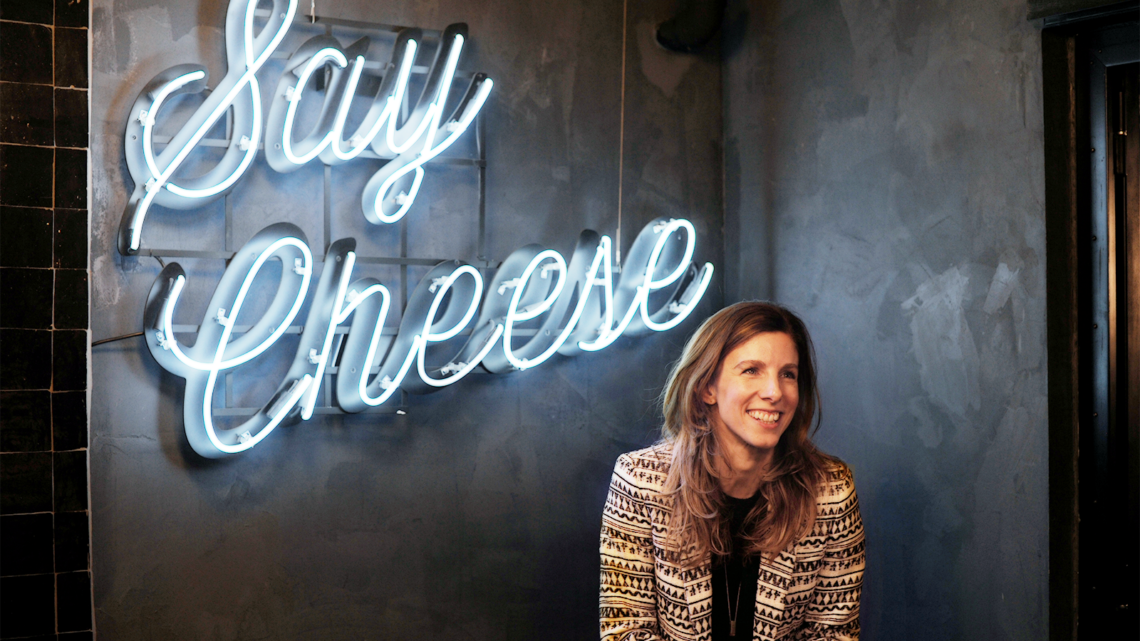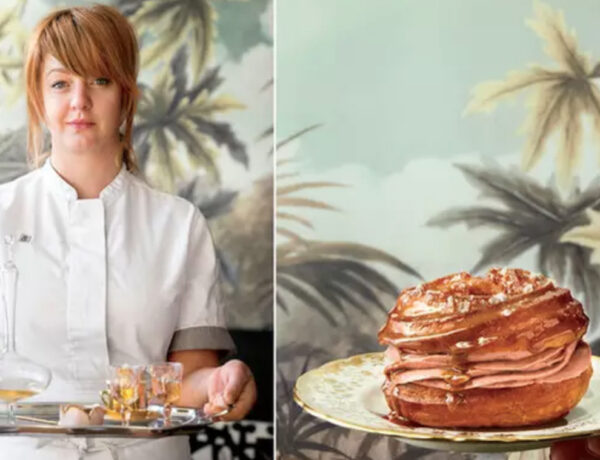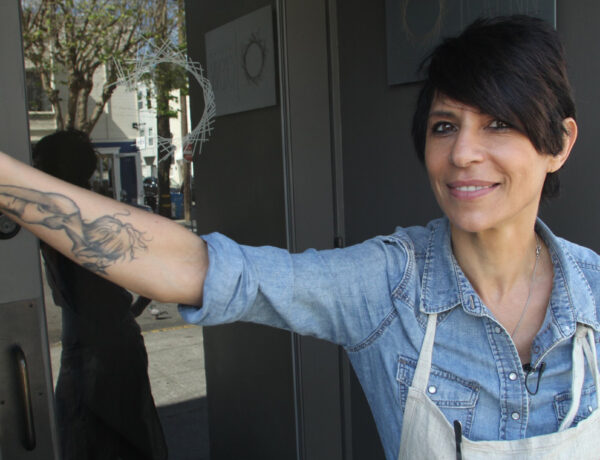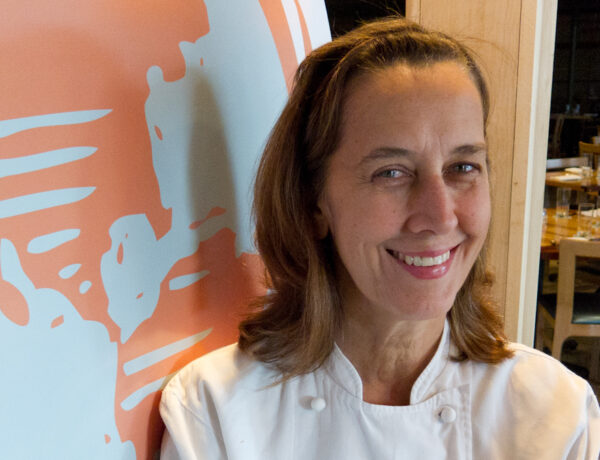When we trekked downtown to the O.G. Murray’s Cheese on Bleecker Street one rainy Friday morning in February, we’re not there, as you might expect, to eat our weight in cheese. Instead, we met up with Elizabeth Chubbuck, Chief Strategy Officer at Murray’s Cheese and a driving force behind the iconic chain’s exceptional growth. At the time we met with Elizabeth, she shared there were plans to open the chain’s 500th store and a new restaurant concept in Long Island City.
As she walked us through the shop and down narrow corridors to the store’s old aging caves—now an intimate but chic event space called The Leroy Room—she talked about her work.
“I spend a lot of my time figuring out how to anticipate what customers want and how to continually grow this 80-year-old business in a modern context.,” Elizabeth said. “Many of our most successful ventures were developed by individuals in the company to meet customer demand— like this private events space, our cheesemaking classes, and the mac n’ cheese bar next door. We’re constantly evolving and looking for ways to create more efficiencies. Part of my job is to shape how we think and move forward.”

As we continued through the rest of the shop, it quickly became apparent that Elizabeth is a cultural fixture at Murray’s Cheese. She greeted each passing cheesemonger by name and with a familiarity that only comes with authentic care and invested time.
Elizabeth is, indeed, invested in Murray’s business. She’s been with the company for over a decade and her role is dizzyingly cross-functional, touching nearly all aspects of the business.
“I oversee the wholesale business with B2B foodservice—restaurants, hotels, airlines, catering—as well as e-comm, marketing, PR, events, education [and] hospitality.”
We asked how she manages to do it all and if she’ll share a little bit of the secret to her success with us. Below is our conversation, abridged and edited for length.
You made a sharp pivot in your early career from publishing into the world of cheese. What inspired that shift and how did you end up at Murray’s Cheese?
In my publishing days, I was selling advertising for large industrial food brands. Simultaneously, I was obsessed with learning about and eating real quality food. The farm-to-table movement was starting to gain momentum. All of my food decisions prioritized provenance and quality ingredients. I started volunteering in the classroom at Murray’s because it gave me access to amazing cheese and constant learning. One day I woke up and realized that the Chef Boyardee ads I was selling, was helping to put more food in pantries across America, but my values around real food and ethical sourcing outweighed the value of the big salary and I took the plunge.
Do you have any advice for women thinking about making a similar pivot into food from an unrelated industry?
Absolutely. My best piece of advice is to strategically leverage the experiences and skills you gained in an outside industry. Unique perspectives, best practices, established processes and structures—these things are often your biggest competitive advantage. I frequently tap friends who work outside of the food industry to share their industries’ best practices and inspire me with new ways to accomplish things here at Murray’s.
Strategizing for your personal growth takes practice.
What was the biggest challenge you faced in this career move?
More than 10 years ago, I left a well-established corporation of 2000+ employees to work for a cheese shop of a few dozen employees. My desk sat next to the boiler in a rough, dark space above our Bleecker Street shop. The freight elevator would regularly breakdown and it would be “all hands on deck” to carry cheese up and down the stairs. We were bootstrapping it in a start-up culture long before start-ups were hip. I was shocked by how scrappy things were, and it took me a while to reorient myself. The advantage of that scrappiness was that I had visibility into so many parts of the business from day one, and I was able to take a hands-on approach and influence positive changes quickly. Today we have more than 250 employees and a quirky office that is full of sunlight. The evolution feels like night and day.
Certain areas of the food and bev industry are still known as being male-dominated. In your experience, is there equal gender representation in cheese-making today?
Cheese-making has historically been women’s work, and we see that historic trend embodied by many of the legendary women cheesemakers in America: Allison Hooper, Judy Schad, The Cowgirls, Pat Morford, etc… Even within the next generation of American artisan cheesemakers, that trend continues.
However, on an international scale, from my observation it skews slightly more male. Women are still making cheese, but larger artisan creameries are predominately staffed by men, particularly in the more mechanized cheesemaking operations. You see more women cheesemakers on the small-scale, farmstead operations.
Because of its roots in domestic labor and perception as “women’s work,” do you think that the profession of cheese making is more welcoming to women than other areas of the food industry?
Cheesemaking has moved so far beyond the scale of domestic labor. The culture and norms that historically allowed women to make cheese have no role in today’s world, and that also applies to cheesemaking. The artisan cheese industry and community are thrilled to embrace female cheesemakers, but larger scale artisan creameries tend to be more male dominated. In September 2019, I visited large artisan creameries throughout France, and Italy. There were very few women in cheesemaking roles. That said, within the larger business of cheese, there are many prominent and successful women throughout the industry. Amanda Parker is Managing Director at Cowgirl Creamery, Michele Buster leads Forever Cheese. Laure Dubouloz is one of the senior-most leaders at Mons Affiners in France. The list goes on and on. In France this past fall, I was pleasantly surprised to meet a female General Manager of a large creamery in the Vosges.

Some of the finest American cheesemakers today are women. Who are some of your favorites?
There are simply too many to list! I called out many of the founding mothers in an earlier question, so I’ll try to focus on some of the next generation.
Adeline Druart – is someone I really admire! She started as a French intern cheesemaker and is now President of Vermont Creamery!
Rebecca Williams of Many Fold Farm in TN is someone I really admire. She stopped making cheese in 2017, but has been a strong voice of advocacy for the artisan cheesemaking world.
Seana Doughty of Bleating Heart Cheese in CA left a desk job to work at a cheese shop in 2008 and then launched her own creamery less than a year later.
Veronica Pedraza is another extremely talented cheesemaker, currently working to launch Blakesville Creamery, a new farmstead goat creamery in Port Washington, WI.
Marieke Penterman of Penterman’s Gouda in Wisconsin makes excellent cheese and will also light up any room!
Leslie Goff, Helen and Kat Feete, Alise Sjostrom… there are simply too many to name!
What has been the biggest accomplishment of your career thus far, and what do you want to achieve next?
I was on the TODAY show for National Cheese Lover’s Day—which isn’t exactly an accomplishment but is certainly a major highlight of my career!
My biggest accomplishments are typically the moments where my teams, or the company at large succeeds. This summer a former employee, who now runs US sales for a large French jam company, told me that he refers to my advice regularly and that his career successes were built on the foundations I helped him establish. Business comes and goes, but the impact we can make on the people around us is lasting.
Business comes and goes, but the impact we can make on the people around us is lasting.
Are there resources you can recommend for women looking to work on the business side of the foodservice industry?
Food conferences are always fun and delicious – they are a great place to network and explore new trends. That being said, I make it a point to attend business conferences outside of the food, beverage, and hospitality business. When you have spent a long period of time within a given industry, you likely have blind spots. Attending tech, advertising or sustainability conferences takes me out of my comfort zones, shows me my blind spots, and inspires me to bring new ideas back to cheese.

Are there any peers that you particularly admire for having created positive change for women working in food?
Breanne Delgado is someone I really admire. I used to sell cheese to her when she worked in the pastry kitchen at Rouge Tomate. She eventually went on to become one of the founders of the Women’s March. I admire Breanne’s grit and tenacity. Her vision for activism through food, and her willingness to step out in front of the crowd and lead, even when the future is so uncertain inspire me to stick to my values and stand up for what really matters.
Is there one thing that you really feel needs to change in our industry? How do you think that will happen?
A large part of people working in the food industry are making close to minimum wage. The work is hard, the hours are long, and they barely take home enough to make ends meet. I believe it is the responsibility of our industry to help customers understand the true cost of real foods, and to work hard every day to pay our people a respectable living wage.
Is there one piece of career advice you received that has stayed with you over the years?
Life and career are so intertwined that most of the advice I pull from is more about living because when we live full, satisfying lives, we are more inspired to show up better at work every day.
Right now the thing that inspires me most is something I heard Robert Glazer quote. Essentially, write down the 20 things you want to accomplish in your life. Identify the top 5. Eliminate the rest as they will only distract you from what matters most.
Life and career are so intertwined … when we live full, satisfying lives, we are more inspired to show up better at work every day.
With all that’s on your plate, how do you manage to make time for yourself and avoid burnout?
It’s all about giving yourself space for unstructured thinking. In order to arrive at strategic solutions, you have to give yourself time to dream and let your brain move far enough away from pain points of daily operations. You have to allow a passive mindset for awhile, give yourself time to think creatively outside the box. Give yourself permission to do nothing.
I actively say no to things to give myself space. I don’t work on the weekends. I sacrifice my social life. I’ll only do 3 things per weekend: yoga, a walk in the park, maybe brunch with a friend. That’s it. It’s a structure that gives me permission to say no to things.
Hungry for more inspiration? Read more Industry Spotlights featuring women finding success in foodservice outside of the kitchen.






No Comments